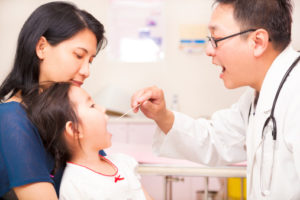School-based health care provides much needed access and preventive care to instill lifelong healthy behaviors
Healthy students are ready to learn and are better prepared to do well in school.
As part of the continuing work to promote student wellness and improve community health, Kaiser Permanente’s Thriving Schools program emphasizes the understanding that healthy students are more engaged and positioned for success.
One key to improved health care for students is, quite simply, access.
A major strategy to provide increased access is school-based health centers, where many schools’ primary care and behavioral health staff collaboratively address the health needs of students. And they do it where children and adolescents spend most of their time — at school.
This February, we recognized School-Based Health Care Awareness Month, a time to highlight how school-based health centers strengthen schools and improve the health of communities.
Let’s look at the ways students, schools and communities benefit from increased access to health care at schools, according to the School-Based Health Alliance and the U.S. Department of Health and Human Services:
- Access — The highest priority of school-based health centers is to ensure that students have access to high-quality health care at school.
- Range of services — School-based health centers provide a host of services, from primary care to mental health care to nutrition education, with a particular focus on prevention and early intervention.
- More students served — Today, more than 2,300 school-based health centers nationwide serve 2 million students. The number of school-based health centers has grown 20 percent in the last 5 years.
- Healthier communities — School-based health centers are health assets for communities. Students can access health care at school, and parents don’t necessarily need to take a day off from work. Also, students do not have to travel to the doctor’s office and miss school.
- Expanded services — School-based health centers increasingly provide oral health services, such as dental screenings.
- Prevention focus — School-based health centers can prevent many chronic illnesses for young people.
- Academic benefits — School-based health center staff and clinicians can act as mentors and partners to help students improve their performance in school.
Investing in health
 Providing health care at school positively impacts students’ health and their learning, which is the ultimate goal of school-based health care. As school-based health centers continue to grow in number, they redefine how children and communities access the services they need to thrive. Continued support and investments are essential.
Providing health care at school positively impacts students’ health and their learning, which is the ultimate goal of school-based health care. As school-based health centers continue to grow in number, they redefine how children and communities access the services they need to thrive. Continued support and investments are essential.
Working with the School-Based Health Alliance in 2013, Kaiser Permanente’s Thriving Schools launched the Hallways to Health program, which utilizes school-based health center integration as a model for healthier schools and healthier communities. Read more about the Hallways to Health program.
For this year’s School-Based Health Care Awareness Month, we celebrate how schools and communities partner with innovative school-based health centers to create healthy environments for students and school staff.
You can participate in the conversation on Twitter at @thrivingschools or by checking out the hashtag #SBHCmonth17.



